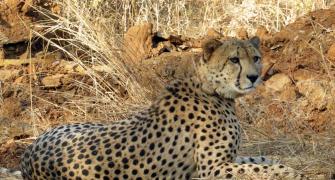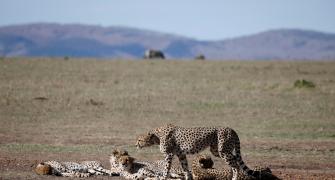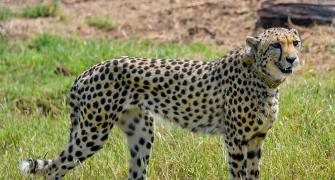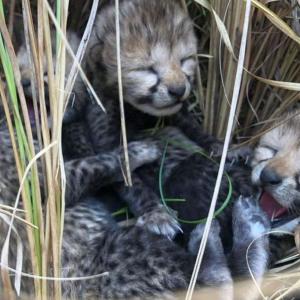A South African delegation, including wildlife experts, will arrive in February to assess the conditions at Madhya Pradesh's Gandhi Sagar Wildlife Sanctuary which is slated to become the second home of cheetahs in India, officials said on Thursday.
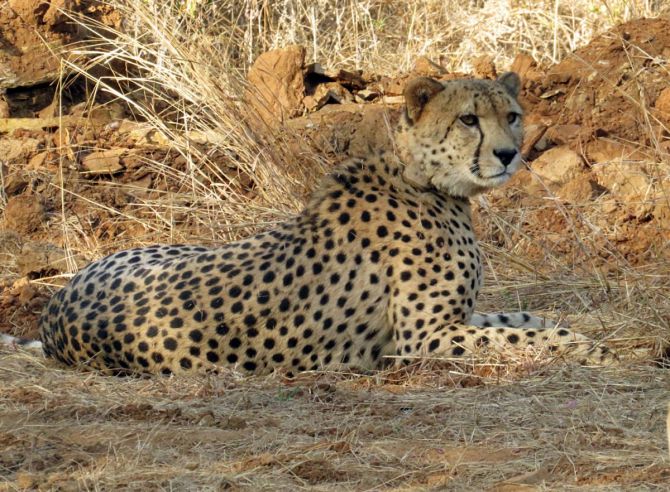
They also said the two female Namibian cheetahs who recently gave birth to a total of seven cubs will be released in the wild only when the weather conditions improve.
An official said that a South African delegation will visit India in February for an assessment of the preparations at the Gandhi Sagar Wildlife Sanctuary.
"Thereafter, a call on bringing the next batch of cheetahs will be taken," the official said.
SP Yadav, additional director general of forests at the environment ministry, had earlier told PTI that the next batch of cheetahs will be imported from South Africa and introduced into the Gandhi Sagar Wildlife Sanctuary.
Another official told the news agency that 90 per cent of the work to prepare the wildlife sanctuary for cheetahs has been completed.
A third official said a 64 square-kilometre enclosure is being prepared at Gandhi Sagar for the cheetahs.
"The focus is on ensuring enough prey per square kilometre (prey base), enhancing staff capacity, patrolling vehicles, wireless systems, improving the quality of grasslands, dialogue with other states, survey of villages, etc.," the official said.
Gandhi Sagar is about a six-hour drive from Kuno. It is spread across 368 square kilometres and has an additional 2,500 sq km area surrounding it.
The official quoted above also said the mother cheetahs and their cubs will not be released into the wild until weather conditions in the Kuno National Park improve.
Officials reported on Tuesday that Namibian cheetah Jwala gave birth to four cubs on January 20. In early January, another Namibian cheetah, Asha, gave birth to three cubs.
This is Jwala's second litter and comes after a gap of 10 months.
The officials said that compared to other female cheetahs, Jwala is a wilder animal. She avoids humans and remains alert even when resting, a typical cheetah behaviour of remaining careful of bigger and stronger predators all the time.
Jwala (Namibian name Siyaya) had given birth to four cubs last March. Three of the cubs succumbed to extreme heat while the sole survivor is being raised under human care for future wilding.
The official said the mother cheetahs and their cubs are being kept in larger enclosures to avoid extreme weather and for better monitoring, which is difficult in the wild.
"We will release them in the wild as soon as weather conditions improve," the official said.
The recent births have taken the number of cubs at the Kuno National Park to eight at present, with seven being born this month.
The total number of cheetahs at the Kuno National Park currently stands at 21 (six males, seven females and eight cubs).
While January recorded the birth of seven cubs, it also witnessed the death of Shaurya -- an adult Namibian cheetah -- on January 16.
Officials said they do not know the reason for Shaurya's death as they have not yet received his post-mortem report.
Since last March, seven adult cheetahs, including Shaurya, have died due to various reasons.
The seven adult cheetahs -- three females and four males -- that died include Sasha, Uday, Daksha, Tejas, Suraj, Dhatri and Shaurya. The first six fatalities occurred in a six-month period between March and August 2023.
Jwala and Aasha are among the cheetahs translocated to India from Namibia under Prime Minister Narendra Modi's Project Cheetah, aimed at re-introducing the only large carnivore species that went extinct in independent India.
The first batch of eight cheetahs was introduced in India in September 2022.
The second batch of 12 cheetahs was flown in from South Africa last February.
The much-vaunted cheetah conservation project, however, has drawn sharp criticism over the animals' deaths.
According to officials, one of the biggest challenges faced in the first year of managing the cheetahs in India was the unexpected development of winter coats by some of the animals during the Indian summer and monsoon, in anticipation of the African winter (June to September).
The winter coat, combined with high humidity and temperatures, caused itching, prompting the animals to scratch their necks on tree trunks or the ground.
This led to bruising and exposing the skin, where flies laid eggs, resulting in maggot infestations and, ultimately, bacterial infections and septicemia, leading to the deaths of three cheetahs, an official explained.
India plans to import cheetahs that do not develop thicker winter coats, Yadav said earlier.
For the cheetahs already in Kuno, he said the plan is to administer prophylactic medicine before the arrival of monsoon to prevent infection.
The project's focus in its second year would be on breeding these animals, he added.

